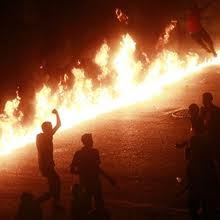Egypt's Prime Minister Essam Sharaf has called for peace after 24 people were killed during clashes between Coptic Christians and security forces, which escalated into riots.
The confrontations occurred in Cairo after an attack on a church in Aswan province last week. It is reported that Muslims joined in the clashed, fighting for both sides.
Sharaf called an emergency cabinet meeting today. There is immense pressure on ministers and on the country's military rulers to give assurances about national harmony. Sharaf said discord between Muslims and Christians in Egypt was "a threat to the country's security".
Sharaf toured the area where the clashes transpired and later in a televised address said: “The most serious threat to the country's security is tampering with national unity, and the stirring of discord between Muslim and Christian sons of Egypt."
He added that violence of this nature, the worst since former president Hosni Mubarak was ousted in February, was "tampering with the relationship between the people and the army".
Egyptian TV showed footage of protesters clashing with security forces as army vehicles burned outside the state TV building where protesters had originally planned a sit-in. There were also reports that vehicles were burning outside the Coptic hospital, where many of the wounded were taken.
Sectarian tensions have increased in recent months. The Copts, who make up about 10 per cent of the population, accuse the military of being too tolerant of religiously prompted attacks.
Thousands of people both Christian and Muslim joined the initial march from the Shubra district of northern Cairo to the state TV building in Maspero Square. They were calling on the military council to sack the governor of Aswan province.
The violence erupted outside the state TV building but soon spread to Tahrir Square, where the demonstrations against Mubarak's regime began. According to a number of reports thousands took to the streets hurling stones at one another. It is thought that Muslims joined in the protests to defend Christians who were being attacked by men in plain clothes who are thought to have been security officials.
Some people have been calling for the Supreme Council of the Armed Forces (SCAF) to hand over power and for its chairman Field Marshal Mohamed Tantawi to resign.
Egypt's health ministry said that at least 24 people had been killed and 212 had been wounded in the violence. Ministry spokesman Hisham Shiha told the BBC that of them at least 86 were security forces.
Sources: BBC News, The Independent, Reuters
For more news and expert analysis about Egypt, please see
Egypt Politics & Security.



















